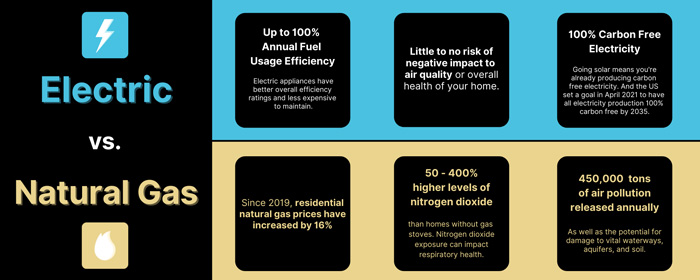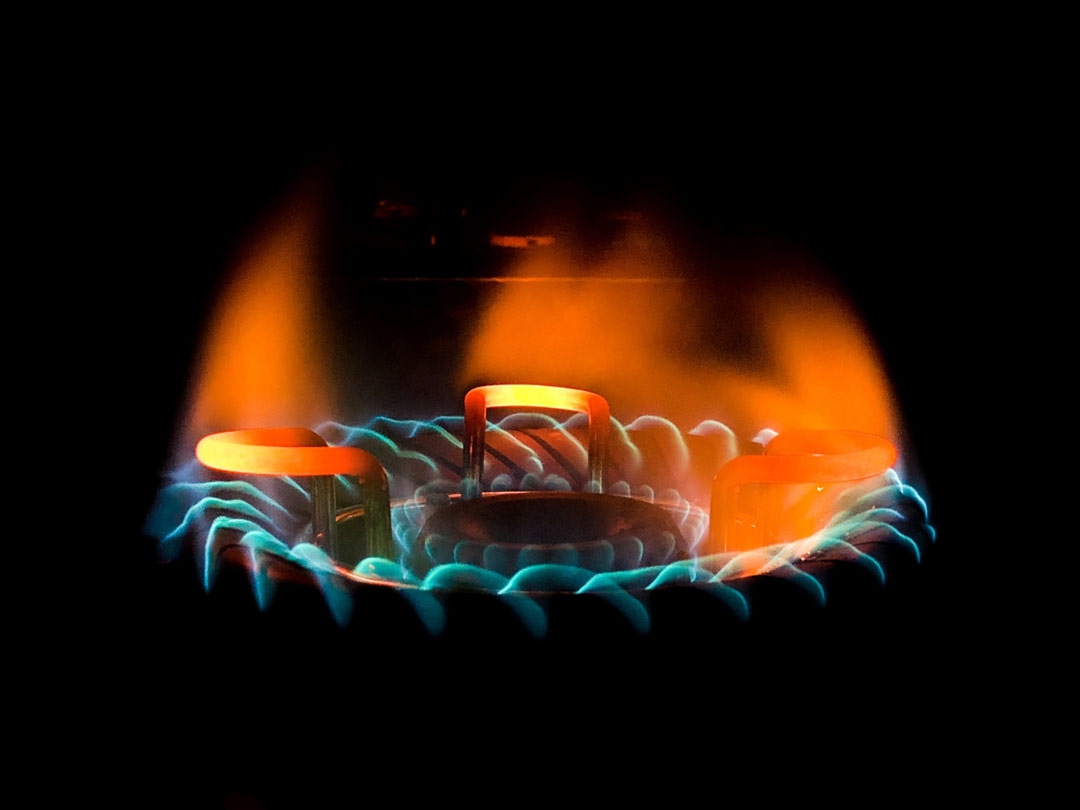Why are Iowa homeowners making the switch to solar and investing in energy efficient electric appliances now?
With rising costs for electricity from power companies across the US, the option to wipe out your power bill and generate all the electricity your home needs right on your rooftop is an attractive one.
But for 48% of Americans who use natural gas to power their homes, even a switch to solar won’t see you completely owning your power. It’s worth considering moving from natural gas to a fully electric home.
Keep reading to learn more.
Why Keep Natural Gas in Iowa?
Most homeowners say they are sticking with natural gas as a power source to save money. But in Iowa that line of reasoning stops making as much sense.
As we head into the winter of 2022, many Iowans might already be readying for another rough winter financially. After all, last year they saw their natural gas bills rise by 46-96% over 2020 costs.
When you factor in the rising cost of natural gas with general efficiency and lifespan of appliances, natural gas stops being an obvious choice. Energy efficiency is better for electric appliances, and natural gas and electric appliances generally have the same expected lifespan.
The good news is that switching to an all electric home is relatively easy. Most homes in the U.S. are already wired and ready to go for a connection to an electrical grid, and providers like MidAmerican and Alliant are required to work with net metering.
Beyond the financial impact, it’s important to understand the impact natural gas use in your home can have.
Drawbacks of Natural Gas for Iowa Homeowners
Fracking, a term that has quickly entered most Americans’ vocabulary, is likely the top reason you can think of to not use natural gas.
It’s true that the process for extracting natural gas has serious risks including chemical spills, degradation of the water supply, and overuse of public water sources in areas already at risk for droughts.
Given that Iowa has worked hard to become a leading state in the US for renewable energy, it’s clear Iowans value energy sources that don’t cause undue harm to the environment and their communities.
However, there are other lesser known issues with natural gas use in the home. One study from Rocky Mountain Institute and Mothers Out Front found that just using a gas stove to cook regularly produces elevated levels of nitrogen dioxide.
Raised levels of nitrogen dioxide in the home can lead to a variety of respiratory and cardiovascular issues, including things like worsening asthma, which is especially concerning for children, the elderly, and anyone with pre-existing health conditions.
Aside from this cause for alarm, many of us are aware of the risk of carbon monoxide poisoning from natural gas in our homes. Even with that signature rotten egg smell to help alert you, natural gas connected to your home is a very real risk factor for dangerous leaks.
Why do Iowans Prefer All Electric Homes?
With 1 in 4 homes in Iowa relying on electric heat (versus 1 in 8 homes for natural gas), it appears that Iowa homeowners already prefer electricity to natural gas for their homes.
One reason for this may be that electricity in the home is overwhelmingly safe. With electric appliances there simply isn’t the risk of unsafe levels of nitrogen dioxide or gas leaks.
Beyond safety, an all electric home means you can take advantage of home appliances becoming more technologically advanced. In the last few years the price of energy efficient appliances like induction stovetops has decreased, and we’ve seen an increased availability and capability of on-demand and tankless water heaters.
Electric appliances are quickly adapting to meet the preferences of folks who prefer natural gas appliances with electric alternatives.
Add to that newly announced rebates and incentives for homeowners to switch to energy efficient and electric appliances, and Iowa’s can save more money by ditching natural gas.

Electric vs. Natural Gas in Iowa: Which Wins Out?
All electric homes look like what we’ll all have in the not-so-distant future, and not just because of the cost savings.
The reality is that the U.S. is moving towards a green, renewable energy future, and electric appliances are ready for that future in ways natural gas appliances simply aren’t.
Homeowners who want to be ready for this future and make the switch to all electric home appliances right now should weigh if there’s a way for them to make the switch sooner rather than later.
Some things to consider include the cost to purchase new appliances, any updates your home needs, and the needs of your family.
Go Solar and Save More
Luckily for homeowners who are considering the switch to solar, the monthly savings you’ll see from wiping out your power bill will quickly pay for the cost to convert your appliances to all-electric.
If you’re ready to take the first step and find out if your roof qualifies for our zero down program, it’s as simple as answering a few quick questions.
Purelight Power can help make the switch to electric appliances and solar simple.





